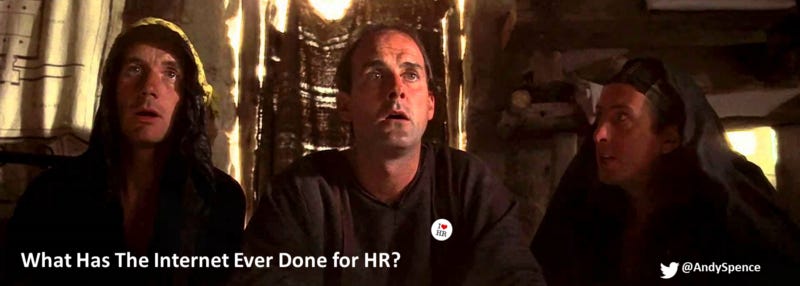What Has The Internet Ever Done for HR?
A look at the benefits and the pitfalls of the internet in HR, with some help from the Romans...
Image courtesy of ‘The Romans’
“All right, but apart from the sanitation, the medicine, education, wine, public order, irrigation, roads, a fresh water system, and public health, what have the Romans ever done for us?” Reg, Monty Python’s Life of Brian.
This article is from the new Workforce Futurist Newsletter and asks some key questions for workforce futurists.
The internet has brought us some great benefits over the last 20 years or so. We can find football scores instantly, do our shopping by swiping photos, and chat online with people like me on twitter.
However, the internet is getting a bit of a bashing, its design flaws are now regularly exposed as we grapple with the consequences of business models that monetise them. We have lost control of our personal data, there have been some major security breaches and can we really be sure of who we are chatting to or exchanging our information with?
All right, but apart from the job-boards, the freelancer platforms, email contract management and social-media, what has the internet ever done for HR?
The internet has brought us many positive developments in HR, including reducing the cost of searching for workers. We can poach valuable workers from competitors and fling our digital CVs/ résumés to a recruiter in seconds. But many of our recruitment practices still mirror the pre-internet age (thankfully not the Roman age) when our processes were paper-based.
In this digital era, we still can’t see all the jobs that are available, and certainly not all of the available and qualified workers. From an economist’s perspective, there is poor visibility of information, friction in the system and this leads to inefficient matching. The reason why there is dependency on intermediaries like the recruitment and staffing industry, is because fundamentally we haven’t yet organised our data properly. We are more than willing to outsource all the searching, checking and processing. It is worth noting that these intermediaries are substantial - in the UK alone, there are nearly 28,000 recruitment agencies, worth £32B in 2016, charging hefty fees of 15–30%.
The Holy Grail for Job Search
No company has done more to make data searchable and useful than Google. Now we have Google for Jobs, which aggregates similar job titles into ‘families’ of jobs that are searchable and organised by discipline.
“What job seekers get is the ability to find jobs from all over the internet, what the employers get is easier discoverability.”
There is currently a drive to use more sophisticated analytics to predict what will make a successful worker in existing teams. However, if we get back to basics, there is little standardisation for describing and rating candidates which makes search harder.
Spamalot
Arguably the biggest fix needed is for centralisation. Take for example the business model of LinkedIn. Most corporate types have profiles on LinkedIn, with 500 million users, which opens up a networking channel for headhunters and professionals. However, the LinkedIn business model requires monetisation of our personal data. We provide our career history FREE of charge, and Microsoft (who own LinkedIn) then sell this data to recruiters.
A decade ago, LinkedIn might have ‘disrupted the recruitment business’ with searchable ‘universal CVs’ for candidates, but instead, it found a way to ‘service the recruitment business’. Centralised social networks are now victims of their own success, with many workers opting out due to unsolicited approaches by salespeople and recruiters. And we now have to deal with Spam. A lot.
Not the Messiah (He’s a Very Naughty Boy)
Any critique of the internet will mention the problem of identity and HR is no exception. Is the candidate who they say they are, have they done what they say they have? An estimated 20 percent to 50 percent of job applicants embellish or outright lie about their credentials.
‘Studied at Harvard’, could well mean ‘Studied Harvard Business Review’
There are also problems with data breaches from centralised databases. This includes, amongst others, LinkedIn in 2016, and more recently HR Software company Page Up, was a victim of a data breach in Australia with 2.6m users in 190 countries. Our personal data out there in the public domain, names, address and bank details.
Until we have fixed some of these infrastructure problems, employers will continue to report shortages of workers and continue to pay fees to intermediaries.
Always look on the bright side of life
So, how do we bring work-matching and recruitment into the digital age?
The issues of identity, centralisation and fraud for the internet are also applicable to recruitment. Distributed ledgers and blockchain offer huge potential to fix many of these problems and solutions are currently being built in the HR space.
By providing decentralised digital work platforms where workers own their own verified career profiles, we can enable more trust in the system which in turn should lead to good work and benefit both workers and employers.
It is clear that we need to build the next generation of digital work platforms, before we do its worth taking stock and reflecting on the benefits and flaws our current systems.
In the future, we might look back, and ask ourselves,
“All right, but apart from verified candidates, secure personal career profiles, frictionless digital work platforms, less intermediaries and fees, more workforce trust, and people reaching their potential through work, what has Blockchain ever done for HR?”
To find out more about the opportunities of Blockchain in HR and Work :-
· My research paper for the Tapscotts BRI is now available for PDF download here -> “Blockchain and the CHRO”
Please help spread the word about the Workforce Futurist Newsletter!


